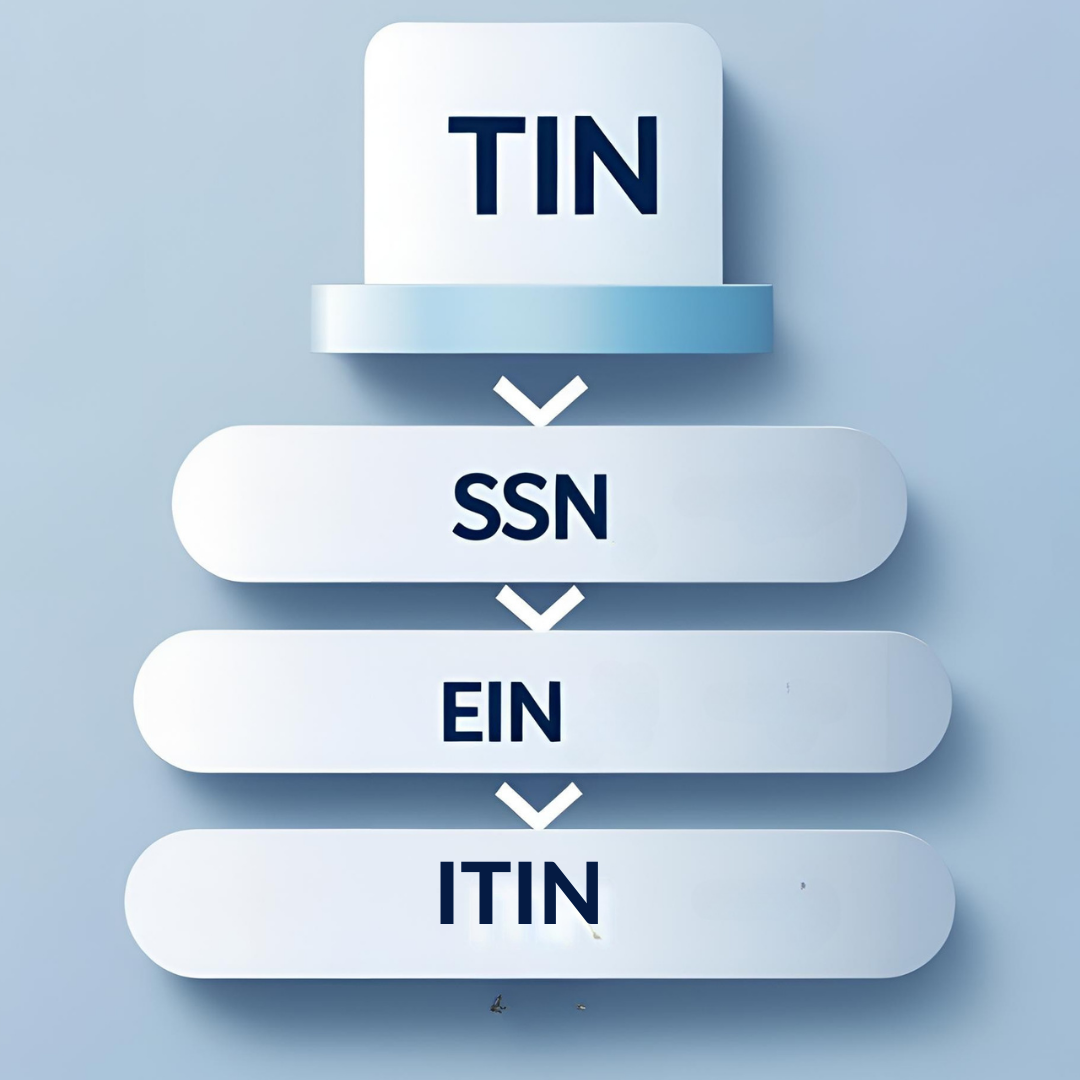Navigating the world of U.S. tax identification numbers can be confusing, especially when you’re trying to understand the difference between TIN vs ITIN. Both are essential for tax filing, but they serve different purposes and apply to different groups of people.
Whether you’re an immigrant, a freelancer, or someone new to the U.S. tax system, understanding TIN and ITIN is key to staying compliant and avoiding unnecessary headaches.
In this simple guide, we will assist beginner taxpayers with the most important distinctions between TIN vs ITIN, which is a frequent misunderstanding for some people.
What Is A Taxpayer Identification Number (TIN)?
Understanding TIN vs ITIN starts with knowing that TIN is an umbrella term, while ITIN is one specific type under it.
Taxpayer Identification Number (TIN) is the key term the IRS associates with identification numbers given to taxpayers who use the tax system. It does not refer to one single number but rather a set of identifiers based on the individual’s circumstances:
- Social Security Number (SSN): Commonly given to citizens and residents of the US.
- Employer Identification Number (EIN): Given to businesses and institutions for taxation.
- Individual Taxpayer Identification Number (ITIN): Meant for people who do not qualify for having an SSN, but must adhere to US taxation laws.
A TIN is likely the most pertinent to U.S tax identification as it serves as an umbrella term for tax identification numbers, aiding the IRS in administering control over tax filers.
Why TIN Matters for Tax Filing and Compliance
Simply, effective tax administration in terms of equity is why the IRS aims to achieve controlled taxation within the country.
The following are reasons TINs are necessary:
Reporting Taxes: Your TIN serves as a means of identifying you with the IRS during your tax return filing. The IRS requires your TIN so they can amalgamate the details you provided with their records. It’s as important as a tax signature—distinct and vital to maintaining everything precise.
Bank and Other MSS: Financial institutions like banks normally demand your TIN to either open new accounts or report interest received by the bank to the IRS. Reporting, however, also includes other times the bank interfaces with the IRS on your behalf.
TINs, including the ITIN for non-SSN holders, play key roles in tax and identity verification. That’s why distinguishing between TIN vs ITIN matters.
The lack of a TIN impedes the IRS from accurately processing your tax documents and might cause penalties or longer waiting periods for reimbursements. It is correct to say that, along with other details required alongside the tax return, the TIN facilitates easier legal compliance with US tax regulations.
What is an ITIN, and what is it used for?
ITIN stands for Individual Taxpayer Identification Number, which is issued by the IRS. The designation is reserved for those people who are obligated to pay taxes in the US but do not have the means to obtain a Social Security Number (SSN).
If you live, work, or earn money in the U.S. but don’t have a Social Security Number (SSN), getting an ITIN number is important to make sure you’re filing taxes legally and staying compliant.
Even though it is just a number, it can aid in garnering refunds you are owed, certain tax credits, and validating your tax history later on. It demonstrates you’re fulfilling your responsibilities and complying with the law.
TIN vs ITIN: What’s set them apart?
Here’s a simple comparison to help you better understand the core differences between TIN vs ITIN.
| Aspect | TIN (Taxpayer Identification Number) | ITIN (Individual Taxpayer Identification Number) |
| Stands for | Taxpayer Identification Number – a general term for any U.S. tax ID. | Individual Taxpayer Identification Number – a special 9-digit IRS ID for individuals. |
| Purpose | Used to identify taxpayers on all tax forms and related documents. Required for work, benefits, and tax filing. | Strictly for tax filing and compliance. Allows individuals without SSNs to file U.S. tax returns. |
| Who Uses It | U.S. citizens, permanent residents, authorized noncitizens, businesses, organizations, and trusts. | Nonresident/resident aliens, foreign students, temporary workers, spouses, and dependents without SSNs. |
| Issued By | SSN: Social Security Administration (SSA). EIN and others: Internal Revenue Service (IRS). | Internal Revenue Service (IRS). |
| Work Authorization | SSN allows legal work if authorized. EIN is for business use only. | No work authorization. Cannot be used to work legally or complete employment forms. |
| Eligibility | SSN requires U.S. citizenship or legal immigration status. EIN is for entities doing business in the U.S. | Only for those not eligible for an SSN but have a U.S. tax filing requirement. Requires Form W-7. |
| Common Use Cases | – Filing taxes (personal or business)
– Working in the U.S. – Opening bank accounts or applying for credit – Receiving government benefits (if eligible) |
– Filing U.S. tax returns
– Claiming tax treaty benefits – Being listed as a dependent/spouse on a return |
| Expiration / Renewal | SSNs and EINs are permanent and do not expire. | ITINs expire if not used for 3 years. Must be renewed with Form W-7. |
| Processing Time | SSN: 2–4 weeks by mail
EIN: Instantly online or ~4 weeks by mail |
ITIN: Usually takes 6–8 weeks. It can take longer during peak tax season. |
Other Tax IDs You Should Know About
While TIN vs ITIN is the most common comparison, there are other taxpayer IDs that serve unique purposes depending on your situation. Let’s break them down.
ATIN – Adoption Taxpayer Identification Number
An ATIN is an abbreviation used for Adoption Taxpayer Identification Number. This is a temporary tax identification number given by the IRS to children in the process of being adopted and who have not yet been assigned a Social Security Number (SSN).
Parents who are in the process of adopting a child might want to file their taxes and claim the child as a dependent before the adoption is complete. In such cases, the parents will not have access to an SSN, which is needed in order to claim the child. In such instances, the ATIN can be used as an alternative.
Who benefits:
In a U.S. adoption case, if the child is already placed with you and you can’t yet obtain an SSN for them, you will apply for an ATIN. This enables you to:
Claim Any Child Tax Credit
Enroll the child as a dependent
Submit your tax returns in time without having to wait for an SSN.
How To Obtain It?
- You will need to complete IRS Form W-7A and submit documents proving:
- You have initiated the adoption process.
- The child currently lives with you.
- You have made attempts to obtain the SSN, but have been unsuccessful.
Note: An ATIN is temporary. After the adoption is legally finalized and the child receives an SSN, the ATIN is redundant.
PTIN – Preparer Tax Identification Number
A PTIN is short for Preparer Tax Identification Number. It’s a number given by the IRS to tax preparers who earn a living assisting others in preparing and filing their federal tax returns.
This helps the IRS identify the tax-paying professionals. In an effort to enhance transparency, accountability, and safeguard taxpayers from deceitful or incompetent tax preparers, such processes are put into place.
Who needs it: It is the case that some professionals, including CPAs or independent tax preparers, who have been paid to prepare or assist with a tax return, are legally required to obtain a PTIN. These include certified public accountants, enrolled agents, tax attorneys, independent tax agents, and volunteers receiving pay.
How it is used: Every federal tax return prepared by a paid professional must include the preparer’s PTIN. This lets the IRS know who did the work and gives them a way to follow up if needed.
You can apply online at the IRS PTIN system. The process is quick and simple:
- Create an IRS account
- Provide some basic information (name, SSN, address)
- Pay a small annual fee (if applicable)
Being acquainted with these elements provides you with a new level of confidence while navigating the tax realm.
Final words
At the start, tax IDs may seem like an unorganized amalgamation of letters: TIN, SSN, EIN, ITIN, PTIN, ATIN. However, when placed in their proper context, the coherence becomes apparent. But once you understand what each one means—and especially the difference between TIN vs ITIN, it becomes much clearer.
Key takeaway: All of these are various forms of Taxpayer Identification Numbers (TINs), which have different functionalities.
Determining your applicable tax ID is more than beneficial; it is empowering. Knowing precisely what tax ID you need and the rationale behind it allows you to remain compliant, circumvent delays, and make far more optimal financial choices.
Get the right guidance from easy filing experts, verifying these IDs becomes simpler, and many common tax questions or issues can be resolved before they even arise.
Frequently Asked Questions About TIN vs ITIN
What’s the difference between TIN vs ITIN?
In the TIN vs ITIN debate, TIN will refer to an umbrella term for all taxpayer identification numbers issued by the IRS. Thus, it comprises Social Security Numbers (SSN), Employer Identification Numbers (EIN), and an ITIN, which is a TIN but for those wanting to file their taxes under the US jurisdiction without an SSN.
Can I use an ITIN to open a bank account?
In some instances, yes. A few banks will allow non-citizens and immigrants’ ITINs to replace SSNs as a prerequisite for opening checking or savings accounts, especially those that service foreigners. That said, policies differ from institution to institution, so checking with the particular bank beforehand is prudent.
Can I get public benefits or a driver’s license with an ITIN?
In general, ITINs do not render individuals eligible for social security, Medicare, or most public benefits. Some states might permit using an ITIN for certain purposes, such as obtaining a driver’s license, but this is inconsistent. Confirming where you live is suggested.
Is an EIN the same as an ITIN?
No, they are completely different. An EIN (Employer Identification Number) is used to identify businesses, non-profit organizations, and other legal entities. An ITIN is solely used by individuals and exclusively for tax administration purposes.
Do I need a TIN or an ITIN to file taxes?
Yes. Every single person filing a tax return in the United States must have some sort of TIN. For citizens and permanent residents, this is usually their Social Security Number (SSN). If a person does not qualify for an SSN—for example, a non-resident student or dependent, then they will most likely require an ITIN
File Your LLC Today
25$ off with a coupon
Lock in EasyFiling's transparent rates and get lifetime compliance support at no extra cost.
Get Started Now








